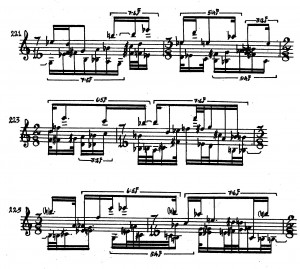The majority of studies of performance focus on the tonal and metric music of the common-practice period, studied at the moment of performance rather than over a period of rehearsal, and usually divorced from the context of real rehearsal and performance (schedules, audiences, auditoria). This paper reports part of a larger project in which three newly commissioned works for solo piano have been studied from the moment that the performer received them, through a period of preparation and rehearsal, to their first public performance. The data consists of interview and diary data, audio recordings, and MIDI data taken from the piano at rehearsals and the public premiere. The paper is a collaboration between one of the composers (Bryn Harrison), the performer (Philip Thomas), and two analysts (Nicholas Cook and Eric Clarke). The paper demonstrates the stability of the performer’s approach to this complex music from a very early stage in the rehearsal process;some interesting attributes of his approach to rhythm and tempo;the function of notation as a “prompt for action” rather than as a recipe for, or representation of, sound; and the concealed social character of solo performance and apparently solitary composition. The paper concludes with a discussion and critique of the“communication” model of performance that prevails in psychological studies of performance
